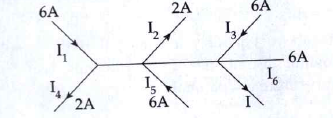Light of wavelength2×10−7m incident on the cathode of a photocell. The current in the photocell is reduced to zero by a stopping potential of 2V. Find the threshold avelength of a cathode.Solution in Marathi
Step by step video & image solution for Light of wavelength 2 xx 10^-7 m incident on the cathode of a photocell. The current in the photocell is reduced to zero by a stopping potential of 2V. Find the threshold avelength of a cathode. by Physics experts to help you in doubts & scoring excellent marks in Class 12 exams.
Updated on:21/07/2023Topper's Solved these Questions
- Dual Nature of Radiation and MatterBOOK - CHETANA PUBLICATIONCHAPTER - Dual Nature of Radiation and MatterEXERCISE - EXERCISE
89 Videos
- Current ElectricityBOOK - CHETANA PUBLICATIONCHAPTER - Current ElectricityEXERCISE - Exercise
92 Videos
- Electromagnetic InductionBOOK - CHETANA PUBLICATIONCHAPTER - Electromagnetic InductionEXERCISE - EXERCISE
109 Videos
Similar Questions
Determine frequency and wavelength of a photon having energy 1.3eW.
View Solution(1)In the following circuit, calculate the value of the current (I).

View SolutionA magnetic flux associated with a coil changes by 5×10−2 Wb in 25 second. Find the emf induced in the coil.
View SolutionA vacuum photocell consists of a central cathode and an anode. The internal surface is silver of work function 4.5 eV. The contact potential difference between the electrodes equals to 0.6 V. The photocell is illuminated by light of wavelength 2.3xx10^-7 m. a. What retrading potential difference should be applied between electrodes of the photocell for the photocurrent to drop to zero? b. If a retarding potential of 1V is applied between electrodes at what limiting wavelength lamda of light incident on the cathode will on the cathode will the photoelectric effect begin?
View SolutionThe cathode of a photocell is irradiated with light of wavelength 3000Å. The current through the cell is found to stop when the potential of the plate is 2.1 V just below the cathode. Calculate the work function of the cathode.
View SolutionThe threshold frequency of the metal of the cathode in a photoelectric cell is 1xx10^(15)Hz . When a certain beamm of light is incident on the cathode, it is found that a stopping potential 4.144 V is required to reduce the current to zero. The frequency of the incident radiation is
View SolutionThe anode voltage of a photocell is kept fixed. The wavelength λ of the light falling on the cathode is gradually changed. The plate current I of the photocell varies as follows:
View SolutionThe anode voltage of a photocell is kept fixed. The wavelength λ of the light falling on the cathode is gradully changed. The plate current I of the photocell varies as follows.
View SolutionThe anode voltage of a photocell is kept fixed. The wavelength of the light falling on the cathode is gradually changed. The plate current I of the potential varies as
View SolutionThe anode voltage of photocellis kept fixed. The wavelength λ of the light falling on the cathode is gradually changed. The plate current I of the photocell varies as follows:
View SolutionThe anode voltage of photocell is kept fixed. The wavelength of incident light on cathode is gradually changed. The plate current I of photocell varies as :
View SolutionThe anode voltage of photocell is kept fixed. The wavelength of incident light on cathode is gradually changed. The plate current I of photocell varies as :
View SolutionLight from a hydrogen discharge tube is incident on the cathode of a photocell. The work function of cathode surface is 4.2 eV. In order to reduce the photocurrent to zero, the voltage of the anode relative to the cathode must be made :
View Solutionएक फोटोसेल के कैथोड का किरणन , 3000 Å तरंगदैर्घ्य के प्रकाश से किया जाता है। सेल में से धारा बंद होती पाई जाती है जब प्लेट का विभव , कैथोड के विभव से 2.5 V नीचे हो। कैथोड का कार्य - फलन निकाले।
View SolutionThe anode voltage of a photocell is kept fixed. The wavelength λ of the light falling on the cathode is gradually changed. The plate current I of the photocell varies as follows :
View Solution
